|
|
|
Sort Order |
|
|
|
Items / Page
|
|
|
|
|
|
|
| Srl | Item |
| 1 |
ID:
130888
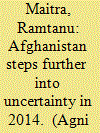

|
|
|
|
|
| Publication |
2014.
|
| Summary/Abstract |
2014 was long anticipated as the year of transition and ushering in of hope for Afghanistan. Three months of this important year are already behind us and, betraying earlier expectations, afghans continue to face stark uncertainties.
|
|
|
|
|
|
|
|
|
|
|
|
|
|
|
|
| 2 |
ID:
131852
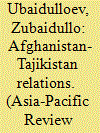

|
|
|
|
|
| Publication |
2014.
|
| Summary/Abstract |
This article attempts to touch upon the relations between Afghanistan and Tajikistan, two neighboring countries, from the historical perspective and the current period. The article analyses the history of Afghanistan-Tajikistan relations during and after the Soviet era, especially during the Afghan Mujahideen's struggle against the Soviet occupational army and Taliban regime in Afghanistan, the Tajikistan civil war of 1992-1997, and after September 11, 2001. In addition, the issues of the ethnic Tajiks in Afghanistan, the violent and vulnerable Tajik-Afghan border, the withdrawal of NATO troops from Afghanistan in 2014 and its impact on Afghanistan-Tajikistan relations, and the new phase of economic relations and an effective cooperation between the both countries are discussed. The article tries to fill the gaps within the body of existing literature and understanding concerning the topic.
|
|
|
|
|
|
|
|
|
|
|
|
|
|
|
|
| 3 |
ID:
130221
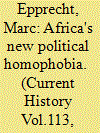

|
|
|
|
|
| Publication |
2014.
|
| Summary/Abstract |
Uganda has a population problem. The United Nations forecasts that the number of people living there will surpass the combined populations of Germany, Italy, and Japan by the end of this century-growing to 205 million in an area about the size of Oregon. It is hard to imagine how this will help with Uganda's
current poverty problem. The nation ranks 161st in the world in the UN's Human Development Index. Having deployed troops in Somalia and South Sudan and suffered terrorist attacks in the capital city, Kampala, Uganda also has a security problem. This partly explains the harassment and repression of the press and civil society groups by a government that is increasingly intolerant of any dissent.
|
|
|
|
|
|
|
|
|
|
|
|
|
|
|
|
| 4 |
ID:
134082
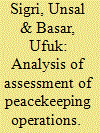

|
|
|
|
|
| Publication |
2014.
|
| Summary/Abstract |
This article proposes a model for assessment of peacekeeping operations. Peacekeeping operations began in 1948, under the authority of the United Nations in order to provide and sustain a peaceful environment throughout the world. International organizations such as the United Nations, the North Atlantic Treaty Organization and the African Union undertake peacekeeping operations in different geographical regions of the world. However, they lack some aspects of the assessment process. There were studies conducted previously in order to determine the principles of the assessment process of peacekeeping operations but none of them presented a comprehensive solution. Therefore, in this study, a clear, comprehensive and detailed assessment model was proposed, which may be applied in future peace operations and shed more light on the subject for future researches.
|
|
|
|
|
|
|
|
|
|
|
|
|
|
|
|
| 5 |
ID:
131624


|
|
|
|
|
| Publication |
2014.
|
| Summary/Abstract |
European Union (EU) interventions in conflict countries tend to focus on governance reforms of political and economic frameworks instead of the geopolitical context or the underlying power asymmetries that fuel conflict. They follow a liberal pattern often associated with northern donors and the UN system more generally. The EU's approach diverges from prevalent governance paradigms mainly in its engagement with social, identity and socio-economic exclusion. This article examines the EU's 'peace-as-governance' model in Cyprus, Georgia, Palestine and Bosnia and Herzegovina. These cases indicate that a tense and contradictory strategic situation may arise from an insufficient redress of underlying conflict issues.
|
|
|
|
|
|
|
|
|
|
|
|
|
|
|
|
| 6 |
ID:
130964
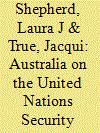

|
|
|
|
|
| Publication |
2014.
|
| Summary/Abstract |
Until 2015, Australia is uniquely positioned on the world stage to make a real difference to women's lives in conflict, transitional and post-conflict countries by ensuring they are actively represented in all peace negotiations1. The Australian government has secured not only a non-permanent seat on the United Nations Security Council (UNSC), but also a seat on the Executive Board of UN Women, the UN entity charged with enhancing gender equality and the empowerment of women. These represent two internationally significant avenues through which the Australian government can fulfil its promise to engage women in the governance of international peace and security, furthering the UN's Women, Peace and Security (WPS) agenda. This agenda, the primary architecture of which comprises seven interrelated UNSC Resolutions dating back to UNSC Resolution 1325 (2000), mandates that women should be represented at and actively participate in all peace negotiations, as well as making binding international commitments to eliminate violence against women and protect women's rights
|
|
|
|
|
|
|
|
|
|
|
|
|
|
|
|
| 7 |
ID:
131619
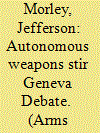

|
|
|
|
|
| Publication |
2014.
|
| Summary/Abstract |
The first multinational conference dedicated exclusively to robotic warfare took place May 13-16 at the UN Office at Geneva as governments around the world confront the emerging technologies that policymakers call "lethal autonomous weapons systems" and headline writers have dubbed "killer robots." The three-day meeting featured diplomats, scholars, and activists debating the implications of new weapons that could automatically target and kill people without human control. Although few such weapons exist now, revolutionary developments in sensors and robotics have stoked fears in some quarters that these weapons systems could make warfare less risky for the attacker and therefore more indiscriminate, but raised hopes in others that they might reduce civilian casualties.
|
|
|
|
|
|
|
|
|
|
|
|
|
|
|
|
| 8 |
ID:
133937
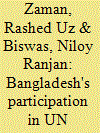

|
|
|
|
|
| Publication |
2014.
|
| Summary/Abstract |
This article argues that the participation of the Bangladeshi armed forces in UN peacekeeping has produced positive benefits for civil-military relations in the country and that this process is best explained by reference to concordance theory, as propagated by Rebecca Schiff. Unlike traditional theories of civil-military relations, concordance theory highlights dialogue, accommodation and shared values or objectives held by the military, the political elites and society. We argue in this paper that peacekeeping has gradually emerged in Bangladesh as an issue where all three partners are converging and prone to hold similar views. This may have a profound impact upon Bangladeshi politics whereby the chances of military intervention in domestic politics will lessen. This paper helps in understanding the implications of Bangladesh's involvement in UN peace missions, an issue on which little work has been conducted until now despite the fact that it has important implications for both the Bangladesh state and its armed forces.
|
|
|
|
|
|
|
|
|
|
|
|
|
|
|
|
| 9 |
ID:
130702
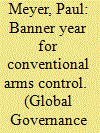

|
|
|
|
|
| Publication |
2014.
|
| Summary/Abstract |
THE CONTROL OF CONVENTIONAL ARMS HAS OFTEN SEEMED THE POOR COUSIN of the global efforts to control weapons of mass destruction (WMD). Since the advent of the atomic era, the focus of arms control and disarmament activity has been overwhelmingly on nuclear weapons and their lesser, if still ugly, stepsisters of biological and chemical weapons. The initial multilateral arms control agreements concerned themselves with limits on the testing of nuclear weapons and, shortly thereafter, with their nonproliferation (e.g., the Nuclear Nonproliferation Treaty of 1968). Bilateral US-Soviet/Russian arms control arrangements also predominantly dealt with the reduction of strategic nuclear forces and restraints on deployments of defenses against (nuclear tipped) ballistic missiles. Efforts to reduce major conventional weapon systems were also taken up in the 1980s in the context of negotiations
between the opposing alliances of NATO and the Warsaw Pact, eventually culminating in the Treaty on Conventional Forces in Europe (CFE Treaty) of 1989. This treaty provided for a massive reduction in the conventional forces that had confronted each other for years in Central Europe and established a new, far more stable security order on the continent. Even the CFE Treaty, however, tended to be overshadowed by other major disarmament agreements concluded in those heady post-Cold War days: the Intermediate Nuclear Forces Treaty (1987), Chemical Weapons Convention (1993), Comprehensive (Nuclear) Test Ban Treaty (1996), and various US-Russian bilateral strategic nuclear arms accords of the 1990s and early 2000s (e.g., the Strategic Arms Reduction Treaty and the Strategic Offensive Reductions Treaty).
|
|
|
|
|
|
|
|
|
|
|
|
|
|
|
|
| 10 |
ID:
130130
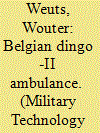

|
|
|
|
|
| Publication |
2013.
|
| Summary/Abstract |
The article evaluates the Belgian DINGO II ambulance from Krauss-Maffei Wegmann (KMW), and discusses its capacities and medical capabilities during its use in the United Nations Interim Force in Lebanon and in the International Security Assistance Force (ISAF) in Afghanistan.
|
|
|
|
|
|
|
|
|
|
|
|
|
|
|
|
| 11 |
ID:
129029
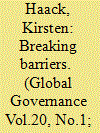

|
|
|
|
|
| Publication |
2014.
|
| Summary/Abstract |
The appointment of Christine Lagarde in 2011 to the leadership of the International Monetary Fund may have been a highlight for women's representation in international organizations, suggesting that the final glass ceiling for women in global governance has been broken. However, this article shows that leadership and representation by women in global governance continues to be curtailed by "glass walls" on the one hand, and flexible glass ceilings on the other. While women in UN agencies today stand on firmer floors, relying on a stronger institutional framework and increasing numbers of women working at all levels of the UN system, women are channeled into gender-specific portfolios, creating glass walls. Moreover, glass ceilings, once shattered, may indeed resettle as recent staff changes by Ban Ki-moon show. Thus, the picture of women's representation and gender equality in UN leadership is a mixed one.
|
|
|
|
|
|
|
|
|
|
|
|
|
|
|
|
| 12 |
ID:
128280
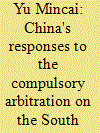

|
|
|
|
|
| Publication |
2014.
|
| Summary/Abstract |
China's responses of turning its back on the compulsory arbitration initiated by the Philippines on 22 January 2013 with respect to aspects of the South China Sea dispute between them under Article 287 and Annex VII of the United Nations Convention on the Law of the Sea and failing to participate in constituting the five-member Arbitral Tribunal raise issues of whether the arbitral process has or can be halted by China and whether China's nonparticipation is in its best interest. This article examines the legal effects of China's actions and China's policy options with respect to the arbitral procedure started by the Philippines.
|
|
|
|
|
|
|
|
|
|
|
|
|
|
|
|
| 13 |
ID:
127336
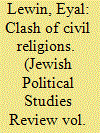

|
|
|
|
|
| Publication |
2013.
|
| Summary/Abstract |
Almost thirty-five years after Camp David and twenty years after the Oslo Accord, a fundamental question remains unanswered: does the majority of the Israeli public support a left-wing or right-wing ideology? The answer, in a democratic system, should be obvious, since elections are supposed to give a clear picture of the political preferences of the voting public. However, Israeli polls are misleading. After the Yom Kippur disaster in 1977, Menachem Begin won his premiership running as the hawkish leader who never would surrender even one grain of sand from the Land of Israel. Yet after he personally gave up the entire Sinai Peninsula his party won an even greater majority in 1981.1 Yitzhak Rabin won his premiership in 1992 representing the hawkish section of the Labor party with declarations that he would never negotiate with the PLO;2 yet it seems that signing the Oslo Accords led him, rather, to the peak of his popularit.
|
|
|
|
|
|
|
|
|
|
|
|
|
|
|
|
| 14 |
ID:
131345
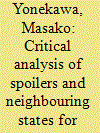

|
|
|
|
|
| Publication |
2014.
|
| Summary/Abstract |
Using Stephen J. Stedman's concept of spoilers as the main analytical framework, this paper offers insights into the failure of the United Nations peacekeeping mission in terms of civilian protection for a lengthy period in eastern Democratic Republic of the Congo. This failure arises not only from peacekeepers' failure to fully analyse the ambiguous status and relationship of spoilers and neighbouring states that are hostile to the peace process but also the United Nations' and peacekeepers' continuing support of spoilers and neighbouring states in three areas of implementation: military integration, military operations, and complacency regarding the chronic culture of impunity for key spoilers. Such support calls into question the neutrality of mediators and of the United Nations. The vicious cycle of violence created by spoilers and neighbouring states is likely to continue unless the United Nations develops appropriate preventive and proactive measures.
|
|
|
|
|
|
|
|
|
|
|
|
|
|
|
|
| 15 |
ID:
127077
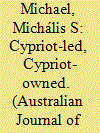

|
|
|
|
|
| Publication |
2013.
|
| Summary/Abstract |
Cyprus occupies an unenviable position among a group of intractable international conflicts which transcend their national borders and whose resolution has eluded third-party mediation. The Cyprus dispute has preoccupied theorists and practitioners of conflict resolution ever since the United Nations stationed its peacekeeping force on the island in 1964. Even attempts by the United Nations to revitalise the Cyprus talks following the 2004 referendum on the Annan plan have not yielded satisfactory results. For decades, the Cyprus problem has challenged conventional international analysis and defied traditional approaches to negotiation and peacemaking. This article grapples with the question of why this conflict has not been resolved despite endless negotiations. By extrapolating three seemingly distinct variables-Cypriotisation, Europeanisation and post-Kemalism-this article alludes to changes in the conflict's contextual parameters that are conducive to a political settlement.
|
|
|
|
|
|
|
|
|
|
|
|
|
|
|
|
| 16 |
ID:
129489
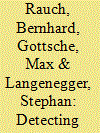

|
|
|
|
|
| Publication |
2014.
|
| Summary/Abstract |
The UN asks governments to report key figures of their annual military budgets with the aim of creating trust among member states. This goal can only be achieved if the data reported is accurate. However, although there are many reasons for governments to falsify data, the UN does not check for manipulation. In this paper, we apply Benford's law to the military expenditure data of 27 states taken from the UN register. Our analysis of the first digits shows that the states with the greatest deviations from the expected Benford distribution and therefore the lowest data quality are the USA and the UK
|
|
|
|
|
|
|
|
|
|
|
|
|
|
|
|
| 17 |
ID:
132668
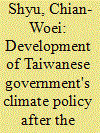

|
|
|
|
|
| Publication |
2014.
|
| Summary/Abstract |
Given its limited involvement in and recognition by international organizations, Taiwan is not presently a signatory to the United Nations Framework Convention on Climate Change (UNFCCC) or the Kyoto Protocol. The objective of this study is to analyze how and the extent to which changes in an exogenous factor, namely the Kyoto Protocol and Post-Kyoto climate negotiations, affect and ultimately lead to the formulation of and changes in the Taiwanese government×s climate policy. This study applies policy network theory to examine the development of and changes in the Taiwanese government×s climate policy. The results demonstrate that international climate agreements and negotiations play a key role in the development of, changes to, and transformation of Taiwan×s climate policy. Scarce evidence was found in this study to demonstrate that domestic or internal factors affect climate change policy. Despite its lack of participation in the UNFCCC and the Kyoto Protocol, Taiwan has adopted national climate change strategies, action plans, and programs to reduce greenhouse gas emissions. However, these climate policies and measures are fairly passive and aim to only conform to the minimal requirements for developing countries under international climate agreements and negotiations. This process results in inconsistent and variable climate policies, targets, and regulations.
|
|
|
|
|
|
|
|
|
|
|
|
|
|
|
|
| 18 |
ID:
128074
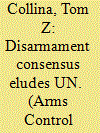

|
|
|
|
|
| Publication |
2013.
|
| Summary/Abstract |
As they complete their annual debate on disarmament and international security, the member states of the United Nations continue to struggle to agree on where to focus their efforts. The next logical step for many, a global ban on the production of fissile materials for nuclear weapons, has been effectively blocked by Pakistan.
Meanwhile, international support is growing to move directly to the elimination of nuclear weapons, which the declared nuclear powers oppose.
|
|
|
|
|
|
|
|
|
|
|
|
|
|
|
|
| 19 |
ID:
132498
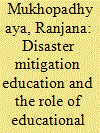

|
|
|
|
|
| Publication |
2014.
|
| Summary/Abstract |
Disasters are increasing exponentially. The number of disaster events which was 73 in 1900-09 has increased to 4494 during 2000-09. More people were affected in the two recent decades than the earlier ones. During the second half of the 20th century, more than 200 major natural disasters occurred in different parts of the world and claimed the lives of around 1.4 million people. In 2011 alone, 302 hazards resulted in disasters that claimed almost 30,000 lives, affected 206 million people and in?icted damages worth an estimated USS 366 billion, according to the United Nations Office for Disaster Risk Reduction.
|
|
|
|
|
|
|
|
|
|
|
|
|
|
|
|
| 20 |
ID:
124635
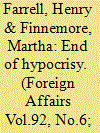

|
|
|
|
|
| Publication |
2013.
|
| Summary/Abstract |
The U.S. government seems outraged that people are leaking classified materials about its less attractive behavior. It certainly acts that way: three years ago, after Chelsea Manning, an army private then known as Bradley Manning, turned over hundreds of thousands of classified cables to the anti-secrecy group WikiLeaks, U.S. authorities imprisoned the soldier under conditions that the UN special rapporteur on torture deemed cruel and inhumane. The Senate's top Republican, Mitch McConnell, appearing on Meet the Press shortly thereafter, called WikiLeaks' founder, Julian Assange, "a high-tech terrorist."
|
|
|
|
|
|
|
|
|
|
|
|
|
|
|
|
|
|
|
|
|